This is a free fortnightly newsletter about the New Zealand Net.
If you would like to be notified by email when a new edition is published, please contact ZL1NZ.
Browse our Newsletter Archive and List of Net Tips.
Featured key
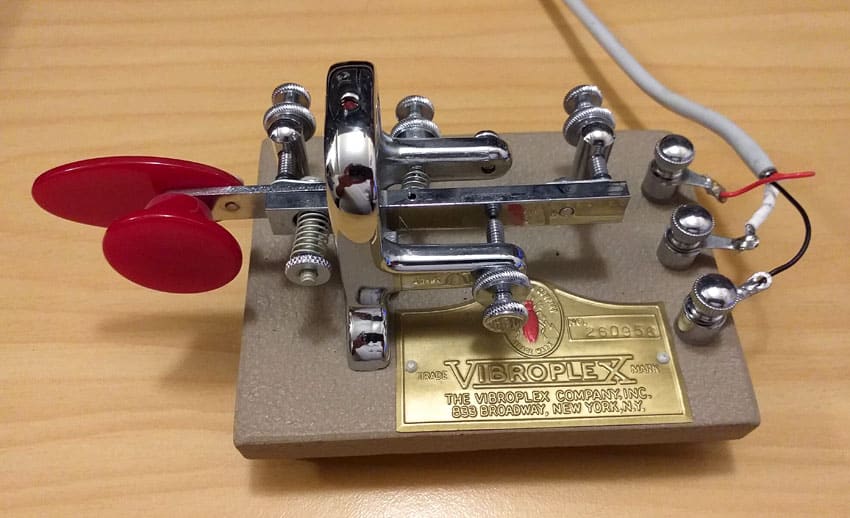
Photo: ZL1NZ
By ZL1NZ
I am fortunate to own two Vibroplex Vibro Keyers: a Deluxe version (chrome base) and this Standard version with the sand-coloured base, made in 1969.
Apart from the bases, they are identical. Both have a jeweled movement, a feature which is now found only on the Deluxe models made by Vibroplex.
I use the Vibro Keyer Standard every evening on the NZ Net. I find that it’s not as easy to use as my Bencher ST1 paddles, but I’m determined to master it. 🙂
Keep scrolling for another of these keys later in the newsletter.
* If you have an interesting key for this feature, please send a nice clear photo and a few words describing it.
Quick notes
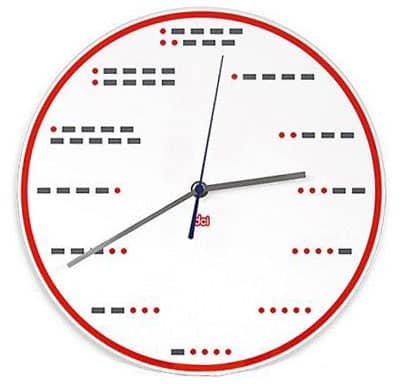 New member: Congratulations to Ben ZL4BDG of Upper Hutt on completing his first 25 check-ins to the NZ Net and thereby becoming a member of the net.
New member: Congratulations to Ben ZL4BDG of Upper Hutt on completing his first 25 check-ins to the NZ Net and thereby becoming a member of the net.
All NZ Net members are welcome to download the membership badge and display it on their QRZ.com page, website, or elsewhere. It all helps to promote the Net.
The Oceania DX Contest (CW) runs from 0600 Saturday 14 Oct UTC to 0600 Sunday 15 Oct UTC. Get details.
Photo flashback
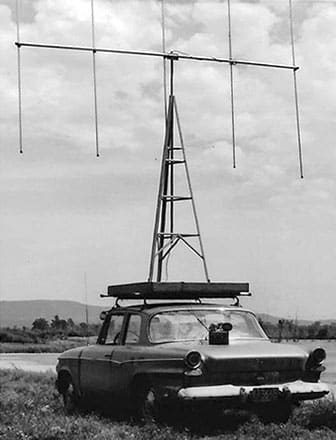 I’ve always wondered how the old-time mobile operators managed: steering the car while shifting gears, rotating the beam and balancing the vibroplex on their knee.
I’ve always wondered how the old-time mobile operators managed: steering the car while shifting gears, rotating the beam and balancing the vibroplex on their knee.
And even more challenging when they went off-road.
You have to admire their dedication. 🙂
ZL2GVA goes POTA (Patio on the Air)
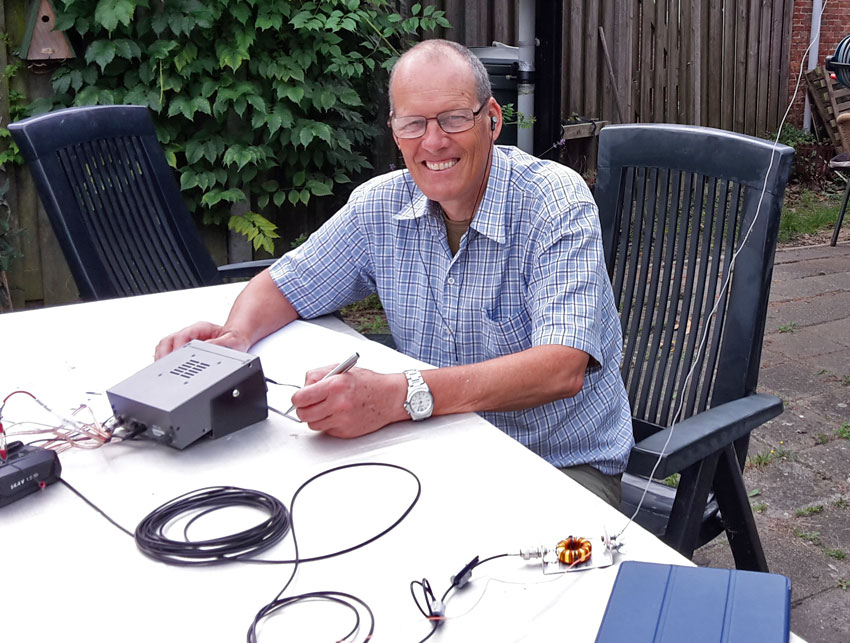
By Gerard ZL2GVA
During our holiday to the Netherlands in September there was occasionally time to get the radio out.
I brought my K1 along. Although it’s only got 80 and 40m, it has an internal tuner and was thus the most compact option. Power came from the battery pack of my brother’s portable electric drill, with a couple of diodes provided by PA5KT to knock the initial fully charged voltage down a bit to below 14V.
I visited Henk PA5KT one evening early on, as he happens to live only a few kilometres away at a rural location with some nice antennas (e.g. a phased array of 40m verticals, which were very effective on receive). Henk is an avid CW contester, at least I call making over 1200 QSOs in 24 hours pretty good!
Funny that a few days after my visit to Henk, I set up my radio and he was the first station I heard and worked during a contest that was on on 80 metres.
Before leaving NZ, I had made up a 1:9 un-un and stripped some multi-core cable to make antenna wires of the thin strands. This worked well, but QRP of course made things a bit hard.
The picture is me sitting on my brother-in-law’s patio with the antenna going up a pole to the right and then off into the garden.
Australian telegraph expert Ron McMullen now a SK
By Kees van der Spek VK1KVS
For the benefit of those who knew him or sought his advice, it is my sad duty to let you know that Ron McMullen passed away 30 September 2023.
Ron was a former Telegraphist, Telegraph Supervisor, Senior Postal Clerk, Instructor, and Postmaster in the Australian PMG Department.
As a collector and expert on all things related to landline telegraphy, Ron possessed a wealth of knowledge which he freely shared through The Australian Telegraph Office website.
And so another chapter of lived history closes. Thank you for the legacy you have left us Ron, RIP.
Students on the key
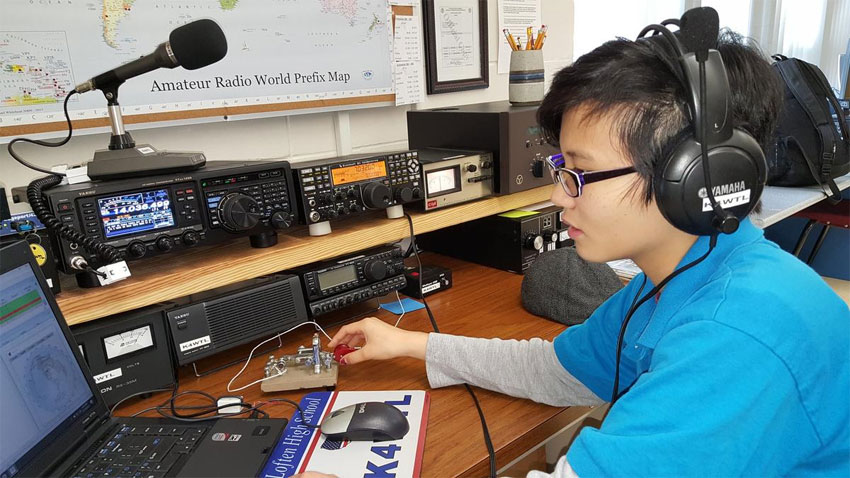
Photo: K4WTL
School amateur radio stations in the USA are often very well-equipped, and K4WTL at a high school in Florida is a good example. But what impresses me most is their classic 1960s Vibro Keyer with the sand-colour base, a nice bit of history for the young hams to enjoy.
Net numbers

NR63 R ZL1NZ 41/38 AUCKLAND 0800Z 3OCT23 = NZNET = SEPTEMBER QNI VK3DRQ 20 VK4PN 19 ZL1AJY 9 ZL1ANY 17 ZL1AYN 3 ZL1GQ 3 ZL1NZ 21 ZL1PX 11 ZL1RA 1 zl2gd 13 ZL2KE 11 ZL2LN 2 ZL2TE 9 ZL4BDG 6 ZL4FZ 5 ZL4KX 17 TOTAL 167 QTC 18 = ZL1NZ
Morse challenge
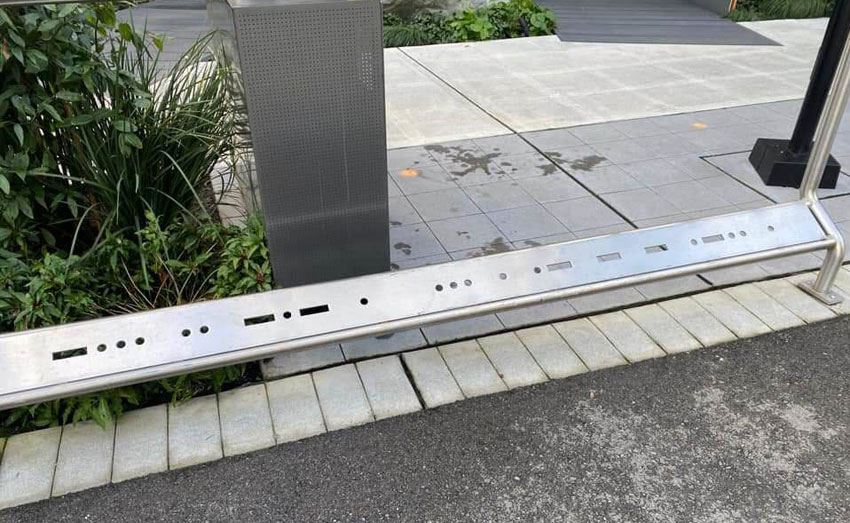
Your challenge: Where is this object and what is its function?
Please send your answers to ZL2KE via radiogram or email.
Answer to previous Morse Challenge
“Our final moment is upon us,” was the message from ZLW on 30 September 1993. The correct answer was received from VK6RR, ZL1ANY and ZL1AYN.
I think I even detected the tear in the eye, at the very end of the transmission. It was evident in the fist.
RIP ZLD and ZLW
77
– Dave ZL4LDY
Video: Full break-in with a TS-890
By Eric NI4E
The TS-890’s full break-in QSK, with solid-state keying, is incredibly quiet.
Keying an external amplifier with the 890 can be either solid-state or relay-engaged. Many conventional Kenwood amp cables, for example, engage the 890 relays. Solid state keying, though, is easily achieved via the use of PIN 7 on the REMOTE connector.
The key is a Ten Tec 40th Anniversary Special Edition Bencher, an unusual iambic paddle that combined the look and style of the single-lever ST-1 with the mechanics of the dual-lever BY-1.
Video courtesy NI4E
Advertising archive
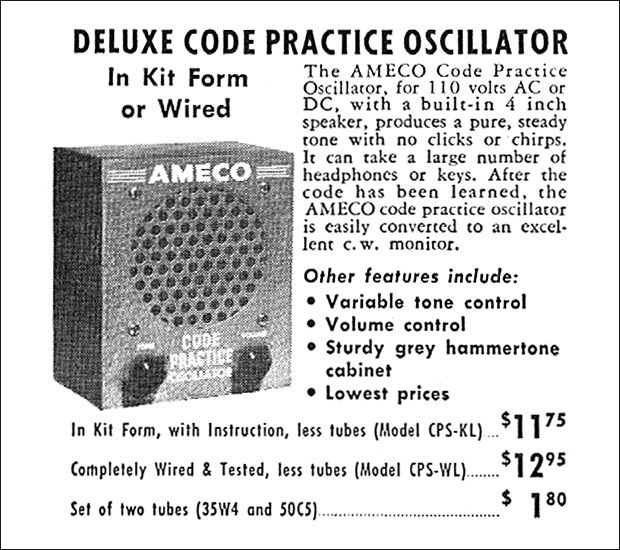
American Electronics Co, 1957
Suggestions?
If you have suggestions on how to make the NZ Net better, or things you’d like to see covered in these updates, please contact ZL1NZ. You might even like to write something for the newsletter.
Thanks for reading, and I hope to hear you soon on the NZ Net!
—
Neil Sanderson ZL1NZ, Net Manager
New Zealand Net (NZ NET)
3535.0 kHz at 9pm NZT Mon-Fri


